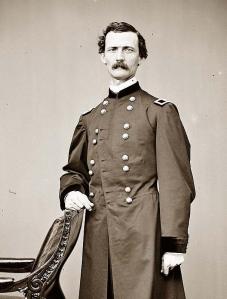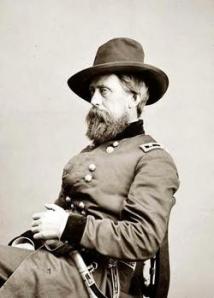It didn’t take long for the two men to clash. When Davis reported to Nelson at the Galt House, a fancy hotel serving as Army offices and Nelson’s quarters, the Maj. General asked Davis for the number of troops gathered and how many weapons they needed. After only two days on the job, Davis later said he couldn’t possibly have answered differently. Nelson was furious.
Maj. General James. B. Fry witnessed Nelson rise and glared down his nose at the diminutive Davis. The following is his description of his encounter:
“But you should know, I am disappointed in you, General Davis. I selected you for this duty because you are an officer in the regular Army, but I find I made a mistake.’
“Davis arose and remarked in a cool, deliberate manner:
“‘General Nelson, I am a regular soldier, and I demand the treatment due to me as a general officer…I demand from you the courtesy due my rank.’
“Nelson replied: ‘I will treat you as you deserve. You have disappointed me. You have been unfaithful to the trust I have reposed in you, and I shall relieve you at once. You will proceed to Cincinnati and report to General Wright.’
“Davis said: ‘You have no authority to order me.’
“Nelson turned toward the Adj. General and said: ‘Captain, if General Davis does not leave the city by nine o’clock tonight, give instructions to the Provost-Marshal to see that he shall be put across the Ohio!”
Needless to say, egos were severely wounded and all hell was about to break loose.
General Wright temporarily defused the situation, but when General Buell took over for Nelson, Wright sent Davis back to Ohio. Davis settled in and began planning an attack against rebels in Kentucky. On September 29, Davis entered Galt house to report. When Nelson arrived, Davis demanded an apology. Indiana Governor Oliver Morton and General Fry overheard the exchange.
Fry said Nelson answered Davis’s demand with a loud, “no!” and “said in a loud voice for all to hear, ‘Go away, you damned puppy. I don’t want anything to do with you!'”
Thoroughly insulted and embarrassed, Davis wadded up the paper he was holding and threw it in Nelson’s face. Nelson slapped Davis with the back of his hand, made a nasty comment to Governor Morton, and stomped toward the staircase. Unbelievably, Davis took a pistol from a nearby friend, walked to within three feet of the towering Nelson and shot the unarmed general in the chest.
According to witnesses, Nelson dragged himself up the stairs before collapsing. “Send for a clergyman,” he gasped. “I wish to be baptized. I have been basely murdered.”
Davis was immediately arrested, but he insisted that while he wanted an apology, he had no intention of murdering Nelson. I’m not sure how you shoot a man point blank in the chest without intention, but I digress. Some officers screamed for Davis’ immediate hanging. General Buell, an admirer of Nelson, called the act “a high crime and gross violation of military discipline. He intended to take quick action, but time was on Davis’s side.
Because time was short and quality officers in need, Buell didn’t have the resources for a court marshall. He wanted Davis to be tried in Washington. Davis’s friend Governor Morton lobbied on his behalf, and Davis was released with in a week. Some accounts also have General Wright coming to Davis’s aid and gaining his release from prison. He escaped conviction because the Union Army was in desperate need for experienced field commanders, and within fourteen days of murdering Nelson, Davis received division command in the Army of the Cumberland.
Davis did receive a very tiny punishment for the murder: he never reached a rank higher than brigadier general of volunteers. He did earn a temporary promotion to major general of volunteers on August 8, 1864, then was appointed commanding officer of the XIV Corps, a post he retained until the end of the Civil War.
Controversy continued to surround Davis during the Ebenezer Creek passing. His racist attitude toward freed slaves was deplorable. On December 9, 1864, Davis ordered a bridge removed before the refugee slaves following his army could cross. Hundreds of slaves were either captured by Confederates or drowned in the Creek.
































Catie Rhodes
Love your new digs! I’ve followed you through wordpress.
Sorry I got the residence of Davis and Nelson backward. That is the story of my whole day. 😀
For some reason, this whole thing has me thinking about the remake of True Grit. I don’t know if you’ve seen it. Apparently, the directors had the actors do period speech. It is so odd to listen to. Try to read the exchange between Nelson and Davis in that style of speaking. You’ll crack up. 😀
stacygreen26
Thanks for finding me here, Catie. No worries. I haven’t see True Grit but I heard it was good. I’ll have to do that. I was cracking up writing it yesterday.
Jessica R. Patch
Like your new home! Yay! Very interesting stuff! I tagged you on my blog today! 🙂
Stacy Green
Thank you so much! I’m working to get my followers back so I really appreciate it:)
Hartford
Congrats on your new digs – love them and love the history! Amazing! 🙂
Stacy Green
Thanks so much! I like WordPress a lot better now that I’ve gotten the hang of it. Glad you liked the post as well:)
oblivia44nie
Hi Stacy, love the new digs. Wild about not being able to comment on Blogger. I’m finding the same problem. I think it’s time for me to find a new home! As far as your post goes, for some reason I was reminded of True Grit too. Love getting a history lesson! Thank you!
Stacy Green
Thanks, Annie. Were you having problems commenting on my blogger? The switch was a pain but I think will be worth it as long as everyone finds me. Glad you liked post!
Tiffany A White
My parents are history buffs, I’m sending this over to them! Great post, Stacy!
Stacy Green
Thanks, I’m glad you liked it. It was fun to research. Hard not to shake my head and laugh at the egos.
Anastasia
I love history! Thanks for sharing this.
Stacy Green
You’re welcome. I love it as well, so it’s fun for me to write. Thanks for stopping by.